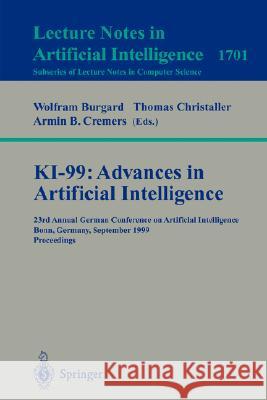KI-99: Advances in Artificial Intelligence: 23rd Annual German Conference on Artificial Intelligence, Bonn, Germany, September 13-15, 1999 Proceedings » książka
KI-99: Advances in Artificial Intelligence: 23rd Annual German Conference on Artificial Intelligence, Bonn, Germany, September 13-15, 1999 Proceedings
ISBN-13: 9783540664956 / Angielski / Miękka / 1999 / 316 str.
KI-99: Advances in Artificial Intelligence: 23rd Annual German Conference on Artificial Intelligence, Bonn, Germany, September 13-15, 1999 Proceedings
ISBN-13: 9783540664956 / Angielski / Miękka / 1999 / 316 str.
(netto: 191,66 VAT: 5%)
Najniższa cena z 30 dni: 192,74
ok. 16-18 dni roboczych.
Darmowa dostawa!
For many years, Arti?cial Intelligence technology has served in a great variety of successful applications. AI researchand researchershave contributed much to the vision of the so-called Information Society. As early as the 1980s, some of us imagined distributed knowledge bases containing the explicable knowledge of a company or any other organization. Today, such systems are becoming reality. In the process, other technologies have had to be developed and AI-technology has blended with them, and companies are now sensitive to this topic. TheInternetandWWWhaveprovidedtheglobalinfrastructure, whileatthe same time companies have become global in nearly every aspect of enterprise. This process has just started, a little experience has been gained, and therefore it is tempting to re?ect and try to forecast, what the next steps may be. This has given us one of the two main topics of the 23rd Annual German Conference on Arti?cial Intelligence (KI-99)held at the University of Bonn: The Knowledge Society. Two of our invited speakers, Helmut Willke, Bielefeld, and Hans-Peter Kriegel, Munich, dwell on di?erent aspects with di?erent perspectives. Helmut Willke deals with the concept of virtual organizations, while Hans-Peter Kriegel applies data mining concepts to pattern recognitiontasks.The three application forums are also part of the Knowledge Society topic: "IT-based innovation for environment and development," "Knowledge management in enterprises," and "Knowledgemanagementinvillageandcityplanningoftheinformationsociety."











